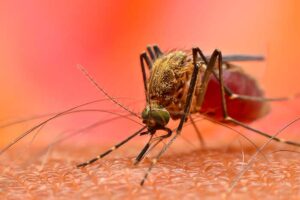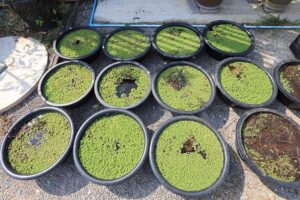Protecting Ourselves Against Mosquitoes in Florida
We are never far from an outbreak of tropical disease carried by mosquitoes in Florida. Between 1990 and 2023 several health scares related to mosquito-borne epidemics occurred in the state, requiring the intervention of the state government to contain the outbreaks. In the 1990s, 3 outbreaks of SLEV (St Louis Encephalitis Virus); in 2016, the Zica outbreak; in 2019, a fatal case of Dengue fever in Miami. Due to its geography, our state is directly exposed to serious health events related to mosquitoes. Considering the fast-growing number of families selecting Florida for their new homestead since 2021, it is essential for new residents to be aware of these outbreaks, and understand their own responsibilities in helping authorities to contain populations of mosquitoes in Florida.
This article is written to help our visitors understand why we must be aware of the dangers of a growing population of mosquitoes in Florida, how we can protect ourselves and our neighbors from them, and how the state government interacts with the healthcare sector and residents to control the mosquito population, and disease outbreaks when they happen.
Mosquitoes in Florida are Disease Vectors
 Certain species of mosquitoes, such as Aedes aegypti and Anopheles quadrimaculatus, are vectors for epidemics due to their feeding habits and the environments they inhabit. Mosquitoes are hematophagous, meaning they feed on blood, and it is during this feeding process that they can transmit diseases.
Certain species of mosquitoes, such as Aedes aegypti and Anopheles quadrimaculatus, are vectors for epidemics due to their feeding habits and the environments they inhabit. Mosquitoes are hematophagous, meaning they feed on blood, and it is during this feeding process that they can transmit diseases.
When a female mosquito bites an infected person or animal, it ingests the pathogen with the blood meal. These pathogens then reproduce within the mosquito. When the mosquito bites another host, the pathogen is transferred via the mosquito’s saliva, which acts as an anticoagulant. This is how viruses like dengue, Zika, and malaria parasites are transmitted to humans.
Mosquitoes are primarily active during dawn and dusk, times when we are outside and exposed. The temperatures in Florida are often too high during the day to be outside, and mosquitoes like warm better than hot. During these hours of the day, female mosquitoes require a blood meal to reproduce, which leads them to seek out hosts… us!
Mosquitoes in Florida thrive in warm, humid environments with standing water, necessary for their eggs to hatch. Our weather is ideal for them, and man-made environments such as urban and suburban areas with artificial containers (buckets, tires, bird baths) provide great breeding sites.
Epidemiologic Models
Epidemiologic models related to mosquito-borne diseases are crucial for predicting disease spread and implementing control measures. One well-known model is the Ross-Macdonald model, which has been used to understand the dynamics of malaria transmission.
The Ross-Macdonald model is a mathematical model developed in the early 20th century by Ronald Ross and George Macdonald to describe the spread of mosquito-borne diseases, particularly malaria. The model takes into account factors such as mosquito population, human population, the rate at which mosquitoes bite humans, and the incubation period of the parasite in both humans and mosquitoes. Despite its simplicity, the model has proven to be reliably predictive and has been adapted to study other mosquito-borne diseases.
In the United States, and Florida in particular, these models have been used to predict the spread of dengue and Zika.
The 2016 Zika outbreak in Miami-Dade County was predicted and managed using adaptations of the Ross-Macdonald model in combination with other models. They predicted the lifecycle of the epidemic by considering factors such as temperature, mosquito population size, and human population density.
These models also predicted zones of faster outbreak growth by considering factors like the presence of the Aedes aegypti mosquito, human population density, and travel patterns. This allowed for targeted mosquito control efforts and public health interventions, such as public education campaigns and distribution of mosquito repellents and bed nets.
Citizen Participation
 Citizen participation has been instrumental in mosquito control efforts. In Louisiana, Florida, Alabama, and South Carolina, public awareness campaigns were designed to educate citizens about the importance of eliminating mosquito breeding sites, such as standing water in containers.
Citizen participation has been instrumental in mosquito control efforts. In Louisiana, Florida, Alabama, and South Carolina, public awareness campaigns were designed to educate citizens about the importance of eliminating mosquito breeding sites, such as standing water in containers.
For example, the “Fight the Bite” campaign in South Carolina and the “Tip ‘n Toss” campaign in Florida encouraged residents to eliminate standing water and use insect repellent. Both campaigns have significantly contributed to reducing local mosquito populations and the spread of mosquito-borne diseases.
Did public sector entities help? Yes. They assisted residents in their efforts to eliminate standing water by providing resources such as mosquito dunks (larvicide) and offering services like property inspections and mosquito spraying. the states of the Southern Belt also mobilized resources like community health workers and volunteers to educate residents and assist in mosquito control efforts.
Cooperation Between Government Agencies and the Health System
 Successful cooperation between government agencies and the health system is crucial in controlling mosquito populations and preventing epidemics.
Successful cooperation between government agencies and the health system is crucial in controlling mosquito populations and preventing epidemics.
In Florida, the Department of Health worked closely with local mosquito control districts and healthcare providers during the 2016 Zika outbreak. These actors coordinated surveillance efforts, shared data on mosquito populations and disease cases, and collaborated on public education campaigns. They also worked together to develop and implement mosquito control strategies, such as targeted spraying and eliminating breeding sites.
This collaboration allowed for rapid response and containment of the Zika outbreak. Similarly, in Puerto Rico during the dengue outbreak in 2010, the CDC worked with local health departments and private healthcare providers to manage the epidemic effectively.
Disease surveillance is implemented through a combination of passive and active surveillance. Passive surveillance involves healthcare providers reporting cases of mosquito-borne diseases to health departments. Active surveillance involves health departments actively seeking out cases, often through testing of individuals in high-risk areas or populations.
This data is then used to monitor disease trends, identify outbreaks, and guide public health interventions. For mosquito-borne diseases, surveillance also includes monitoring mosquito populations and testing mosquitoes for pathogens.
Our role
 Mosquito control companies such as A-NIKS also play a role in this giant task of preventing the unchecked growth of mosquito populations. We accomplish our role in several ways:
Mosquito control companies such as A-NIKS also play a role in this giant task of preventing the unchecked growth of mosquito populations. We accomplish our role in several ways:
A- We build mosquito misting systems. These are very efficient at killing mosquitoes and larvae in all the nooks and crannies of a property, and keeping people’s yards protected from the intrusion of flying and crawling insects. You can discover these mosquito misting systems by clicking on that link.
B- We also offer a spray service which a good control measure with lasting effects. We use a plant-based insecticide that combines several plants known to be insect-repellant. Because our insecticide is natural, is does not harm people or pets, even if we recommend that people stay in their home for 30 minutes after we spray. The insecticide will stay on the leaves for up to 3 weeks, because it bonds with the chemicals of the leaves. SO people can expect about 20 days of protection from a single spray.
C- MosquitoGo is a third way we help people protecting themselves. We use your existing sprinkler system to distribute our natural insecticide throughout your garden. When you water your lawn and plants, our insecticide is sprayed at the same time. This is not as good a solution as a mosquito misting system, but this is as good as it gets to achieve a good level of protection and extend the number of hours families can spend outside in their garden without being constantly harassed by Florida mosquitoes.
If spending more time outside without heavy mosquito attacks is something desirable to you, call us to make an appointment with one of our technicians, and he will show you the ins and outs of effective protection against mosquitoes in Florida.


